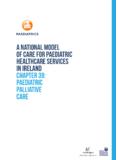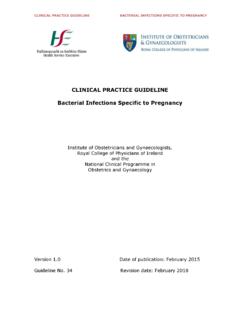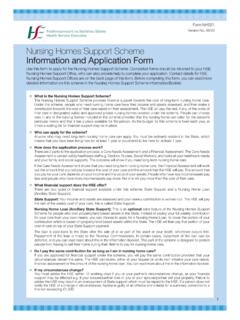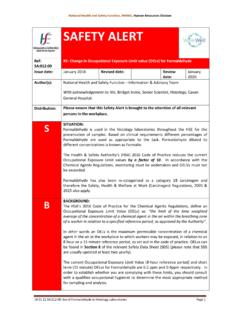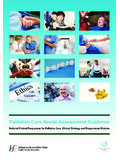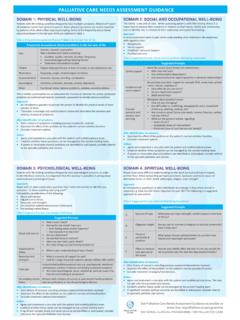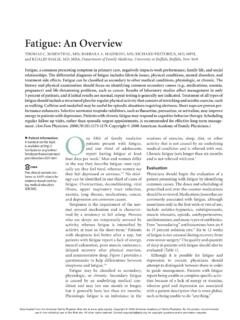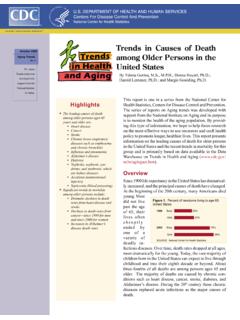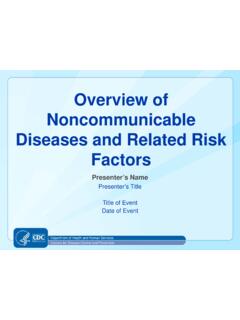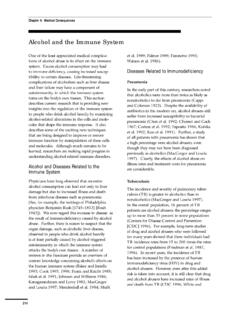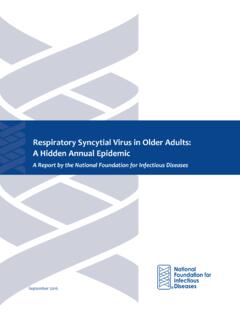Transcription of Living Well with a Chronic Condition
1 Living well with a Chronic Condition : Framework for Self-management SupportNational Framework and Implementation Plan for Self-management Support for Chronic conditions : COPD, Asthma, Diabetes and Cardiovascular diseaseSelf-management Support This framework and implementation plan was developed by a Health Service Executive (HSE) working group, under the leadership of Dr. Orlaith O Reilly National Clinical Advisor and Programme Lead Health and Wellbeing, with the support of an advisory group. Membership of the working group is listed below and membership of the advisory group is listed in Appendix of the Self-management Support for Chronic conditions Working GroupNameTitle Dr Carmel MullaneyLead for development of National Self-management Support framework, Specialist in Public Health Medicine, Health and Wellbeing DivisionMairead GleesonNational Group Programme Manager Health and Wellbeing Division & Clinical ProgrammesGeraldine QuinnHealth Promotion and Improvement / Quality Improvement DivisionGemma LeaneResearch Officer, Public Health Department, Health and Wellbeing DivisionMargaret HumphreysNational Lead for Structured Patient EducationMaeve McKeonSelf-management Support Coordinator.
2 DonegalBrid KennedyDonegal Long Term conditions Programme ManagerDr Louise DohertySpecialist in Public Health Medicine, Department of Public Health, HSE North West, Health and Wellbeing DivisionKathleen JordanProject Manager Self-management Support for Chronic conditions (October 2016 April 2017)National Framework and Implementation Plan for Self-management Support for Chronic conditions : COPD, Asthma, Diabetes and Cardiovascular DiseaseSelf-management Support ForewordHealthcare provided by professionals represents just the tip of the ice-berg in supporting patients with Chronic conditions . The majority of care for Chronic conditions is provided by the person themselves. The majority of people over 65 years have two or more Chronic conditions . Our population aged 65 years and over is growing by approximately 20,000 each year, and with it the numbers Living with Chronic conditions .
3 Enabling our health services to cope with the increased number of people Living with Chronic conditions , will depend on the extent to which people engage with their own health and health conditions . Supporting and empowering people in managing their conditions as well as possible can improve quality of life and reduce the impact on health and the likelihood of complications, hospitalizations and deaths from these conditions . The National Self-management Support Framework for Chronic conditions : COPD, Asthma, Diabetes and Cardiovascular disease , sets out how we in the health services, and working with patients and our partners across the wider system, want to support patients to engage with and manage their conditions , through collaborative relationships and supportive interventions.
4 Supporting self-management is inseparable from high quality care for people with long term conditions and is a priority for patients. Organisational and clinical leadership will be essential to support the culture change necessary in moving from reactive to more pro-active and person-centred care, with the patient an active partner in their own healthcare. Self-management support is a critical element of our journey toward building a sustainable health service. This Framework, focusing on people Living with Chronic conditions , supports the implementation of Healthy Ireland throughout the health services and beyond. The concept of self-management is one that cuts across the prevention spectrum (primary, secondary and tertiary prevention) by establishing a pattern for health early in life and providing strategies for mitigating illness and managing it in later life.
5 The Framework and the approach set out, lays the foundations for the work that is required over the months and years ahead. This work, when fully implemented over a number of phases, will re-shape and re-direct our focus toward the patient, their lived experiences coping with and managing their health and their Condition . It will support a collective shift in emphasis toward creating enabling, supportive and transformative environments that put the patient first, realising the value of active participation and effective collaborative interactions between patients and healthcare , this Framework and the work ongoing to implement it, will support a shared, common, evidence based understanding of how particular models of care can better support patients and reduce the pressure on healthcare services into the future.
6 We look forward to building support and increasing resources for the implementation of this framework nationally, regionally and locally in collaboration with Community Healthcare Organisations and Hospital Groups; in collaboration with our patients and with partners in the wider health system, including general practice, academia, voluntary groups and communities. Above all, we look forward to the positive impacts on the health and wellbeing of our patients and their families that will ensue. Dr. Stephanie O Keeffe,National Director, Health and WellbeingDr Aine Carroll,National Director, Clinical Strategy and Programmes 2 National Framework and implementation Plan for Self-management Support for Chronic conditions : COPD, Asthma, Diabetes and Cardiovascular DiseaseIntroductionEvery day, people with long-term health conditions , their family members and carers will make decisions, take actions and manage a broad range of factors that contribute to their health.
7 Self-management support acknowledges this and supports people to develop the knowledge, confidence and skills they need to make the optimal decisions and take the best actions for their health. Evidence of positive outcomes highlights the benefit of supporting people to manage their own health as effectively as possible. These benefits can be felt by people with long-term health conditions , health professionals, and the health services1. Chronic diseases are recognised as a major component of health service activity and expenditure, as well as a major contributor to mortality and ill-health. Thirty eight percent of Irish people over 50 years have one Chronic Condition , 11% have two or more of eight Chronic conditions2 and 65% of adults over 65 years have two or more Chronic conditions3.
8 The prevalence of diabetes, cardiovascular and respiratory disease continues to increase due to our ageing population and prevalence of risk factors3. People with Chronic diseases presently utilise around 70% of health services resources4. They are more likely to attend their GP, to present at Emergency Departments, to be admitted as inpatients and to spend more time in hospital, than people without such conditions . Approximately 80% of GP consultations and 76% of hospital bed days used are related to Chronic diseases and their complications5,6. It has been estimated that in Ireland approximately 1 million people suffer from heart disease , diabetes or respiratory disease7. For all Chronic conditions the prevalence is significantly higher in people with lower levels of education and in lower socio-economic people to self-manage their health conditions through systematic provision of education and supportive interventions increases their skills and confidence and improves outcomes for patients ranging from quality of life and clinical outcomes, to reduced healthcare utilisation including hospitalisation8.
9 Reported costs vary according to the intensity of the intervention, but are typically low relative to the overall cost of care for the Chronic Condition in question and in some instances, can result in cost savings through reductions or shifts in healthcare utilisation8, support is an important aspect of the Integrated Care Programme for the Prevention and Management of Chronic disease , and is key to delivering person-centred care, in which patients are empowered to actively participate in the management of their Condition . It is closely aligned with the HSE goal of promoting health and wellbeing as part of everything we do so that people will be support interventions are any interventions that help patients to manage portions of their Chronic Condition or conditions through education, training and support8.
10 The most effective self-management support interventions are multifaceted; tailored to the individual (their culture and beliefs) and tailored to specific conditions . They are underpinned by a collaborative relationship with a healthcare professional within a healthcare organisation that actively promotes framework sets out what the health services must do to support people with Chronic conditions in managing their conditions . The provision of interventions at patient level is not enough. International evidence indicates that we must also take action at the levels of healthcare professionals education and training; the organisation including resourcing and coordination; and the wider system through working in partnership with GPs, academia and voluntary organisations, and patients themselves, in order to successfully support self-management.
